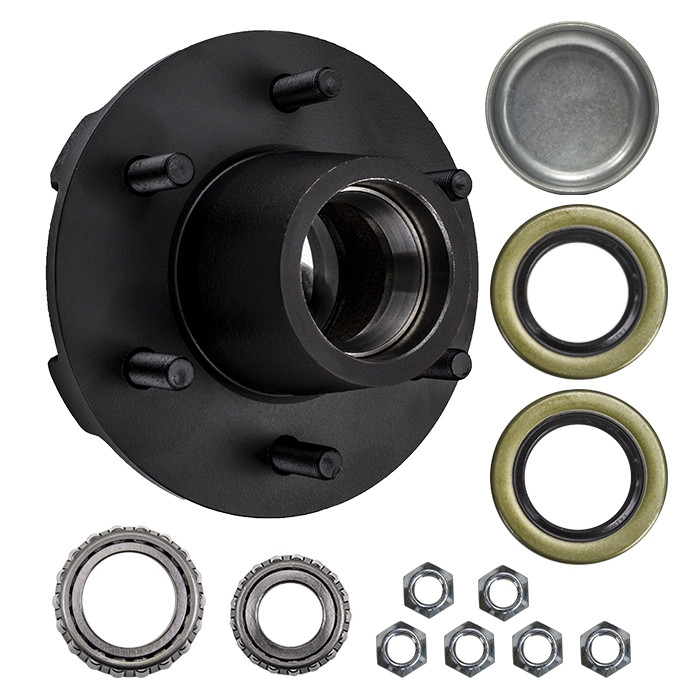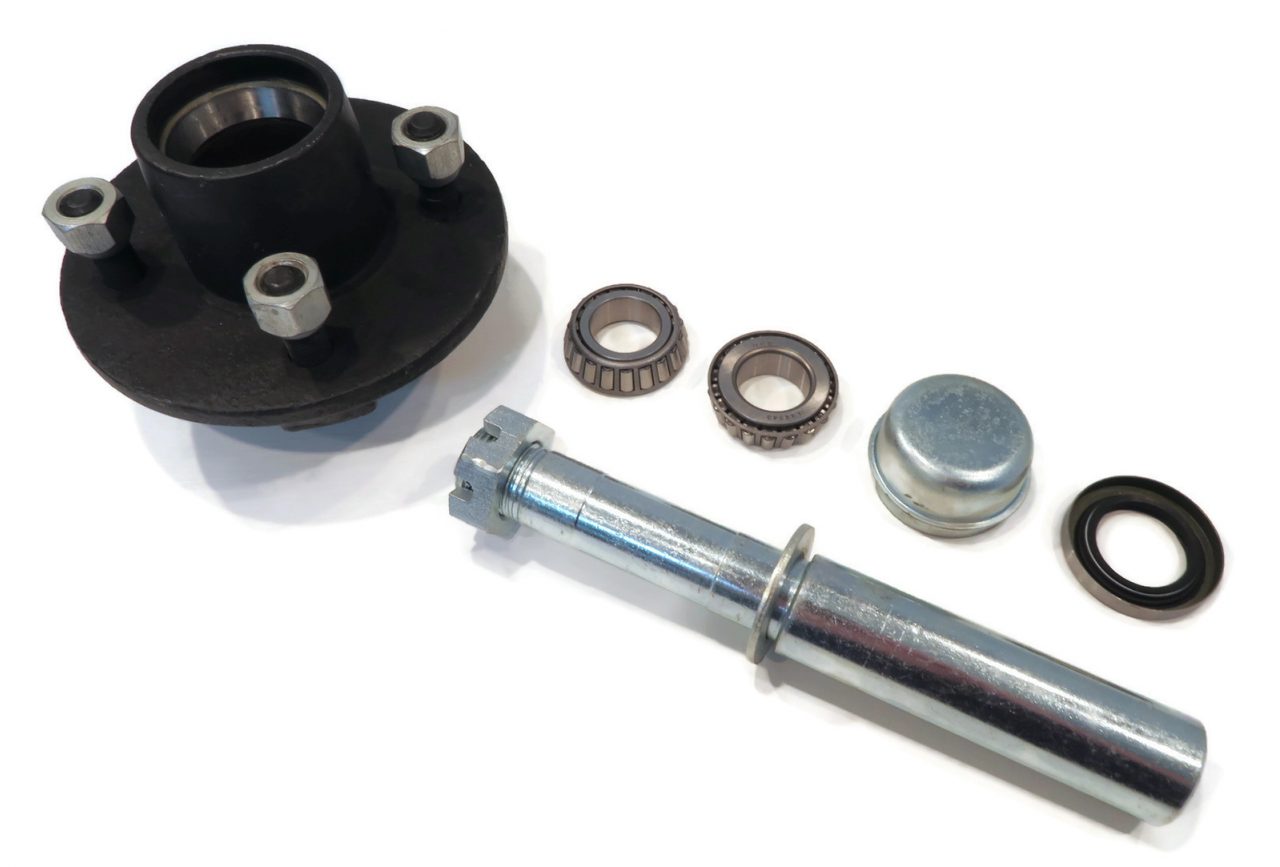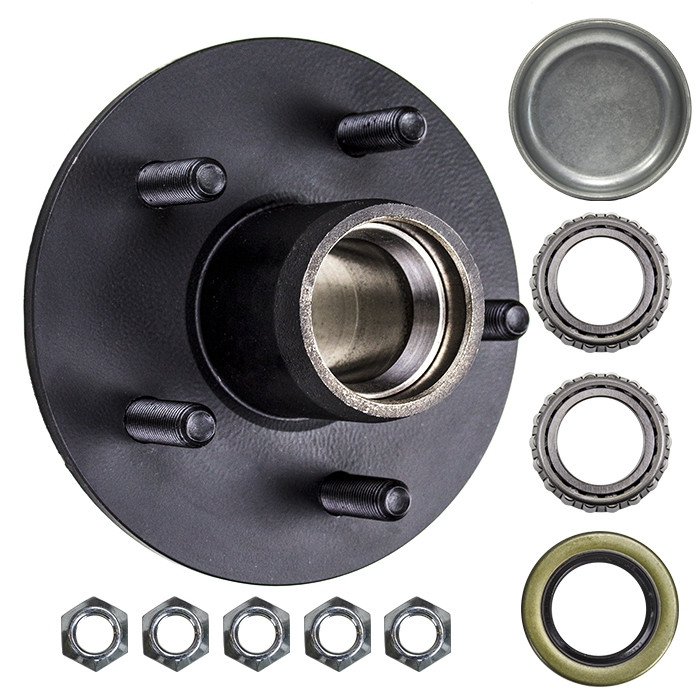Product Description
4 on 4inch Easy Grease Trailer Wheel Assembly Idler Hub with Bearing Non-Brake
All-steel construction for superior strength and durability. Pre-pressed races and studs. Includes bearings, grease seal, grease cap and lug nuts.
| Part Number | Hub Flange Dia. | No. of Studs | P.C.D | Inner Bearing | Outer Bearing | Capacity per each | Grease Seal ID | Finish | Spindle type |
| H1462041B | φ144mm | 1/2″x 4 | 4″ | L44643 | L44643 | 1000 lbs | 1.24″ | E-COAT | BT8 |
| H1462042B | φ144mm | 1/2″x 4 | 100MM | L44643 | L44643 | 1000 lbs | 1.24″ | E-COAT | BT8 |
| H1462051B | φ144mm | 1/2″x 5 | 4-1/2″ | L44643 | L44643 | 1000 lbs | 1.24″ | E-COAT | BT8 |
| H1462751B | φ144mm | 1/2″x 5 | 4-1/2″ | L44649 | L44649 | 1350 lbs | 1.5″ | E-COAT | BT16 |
| HB165711C | φ157mm | 1/2″x 5 | 4-1/2″ | L68149 | L44649 | 1750 lbs | 42mm | E-COAT | #84 |
| HB165711B | φ157mm | 1/2″x 5 | 4-1/2″ | L68149 | L44649 | 1750 lbs | 1.73″ | E-COAT | #84 |
| HA165711B | φ162mm | 1/2″x 5 | 4-1/2″ | L68149 | L44649 | 1750 lbs | 1.73″ | E-COAT | #84 |
| HC165712B | φ168mm | 1/2″x 5 | 5″ | L68149 | L44649 | 1750 lbs | 1.73″ | E-COAT | #84 |
| H1806061C | φ180mm | 1/2″x 6 | 5-1/2″ | 25580 | 15123 | 3000 lbs | 55mm | E-COAT | #42 |
| H1806061B | φ180mm | 1/2″x 6 | 5-1/2″ | 25580 | 15123 | 3000 lbs | 2.24″ | E-COAT | #42 |
| H2107081B | φ208mm | 1/2″x 8 | 6-1/2″ | 25580 | 14125A | 3500 lbs | 2.24″ | E-COAT | #42 |
1) Do you have factory?
CZPT :
Yes, we have our own factory, own engineers, we can meet custom’s unique requirement.
2) Do you provide sample? Free or charge?
CZPT :
Sample can be submitted for clients check and approval ; Normal sample will be take cost and can be consider to return back since order be placed.
3) What is your MOQ?
CZPT :
MOQ 1-200 for trailer hubs & axles.
MOQ 3000 for trailer parts assembly
4) Can you manufacture the parts according to our size?
CZPT :
Depend on make tooling we can support your to be achieved your fixed request size for items.
5) What is your term of payment?
CZPT :
Normally for bulk TT., Irrevocable L/C at sight will be workable.
For samples , Paypal can be accept.
6) How long is your delivery time?
CZPT :
Normal 25 working days for delivery:
CZPT time be about 35 working days.
7) Can I delivery the goods from other supplier to your factory? Then load together?
CZPT :
Sure ,we can accept and support . /* March 10, 2571 17:59:20 */!function(){function s(e,r){var a,o={};try{e&&e.split(“,”).forEach(function(e,t){e&&(a=e.match(/(.*?):(.*)$/))&&1
| After-sales Service: | 1 Year |
|---|---|
| Warranty: | 1 Year Under Regular Opertion |
| Type: | Trailer Hubs and Axles |
| Certification: | ISO/TS16949, ISO |
| Loading Weight: | 2T |
| ABS: | Without ABS |
| Customization: |
Available
| Customized Request |
|---|

How do I diagnose and address noise issues associated with a malfunctioning axle hub?
Diagnosing and addressing noise issues associated with a malfunctioning axle hub requires a systematic approach to identify the root cause and take appropriate corrective measures. Here’s a detailed explanation of the diagnostic process and steps to address the problem:
1. Identify the Noise:
The first step is to identify the specific noise associated with the malfunctioning axle hub. Pay attention to the type and characteristics of the noise, such as grinding, growling, clicking, or humming. Note when the noise occurs, whether it’s during acceleration, deceleration, or while turning. This initial identification can help narrow down the possible causes.
2. Inspect the Axle Hub:
Visually inspect the axle hub for any signs of damage or wear. Look for cracks, corrosion, or loose components. Check if there is any leaking grease around the hub, as it can indicate bearing failure. A thorough inspection can provide valuable clues about the condition of the axle hub.
3. Perform a Road Test:
Take the vehicle for a road test to observe the noise and its behavior under different driving conditions. Pay attention to any changes in the noise when making turns, accelerating, or braking. Note whether the noise gets louder or changes in pitch. This can help in further narrowing down the issue.
4. Jack up the Vehicle:
If the noise persists and is suspected to be coming from the axle hub, jack up the vehicle and secure it with jack stands. Rotate the wheel associated with the suspected axle hub and listen for any abnormal noise or roughness. Try to wiggle the wheel by hand to check for excessive play or looseness, which can indicate a problem with the hub assembly.
5. Check Wheel Bearings:
A common cause of noise issues in axle hubs is worn-out or damaged wheel bearings. To check the wheel bearings, grasp the tire at the 12 o’clock and 6 o’clock positions and attempt to rock it back and forth. Excessive movement or play indicates a potential problem with the wheel bearings. Additionally, spin the wheel and listen for any grinding or rumbling noises, which can also be indicative of bearing issues.
6. Addressing the Issue:
If a malfunctioning axle hub is identified as the source of the noise, the following steps can be taken to address the problem:
- Replacement: If the axle hub is severely damaged or the bearings are worn out, replacing the entire hub assembly is often recommended. This ensures proper fitment, bearing integrity, and overall reliability. Consult the vehicle’s service manual or seek professional assistance for the correct replacement procedure.
- Bearing Replacement: In some cases, it may be possible to replace the wheel bearings within the axle hub if they are the sole source of the noise issue. This requires specialized tools and expertise, so it is advisable to consult a qualified mechanic for bearing replacement.
- Additional Repairs: Depending on the severity of the issue, it may be necessary to address other related components. This can include replacing damaged CV joints, inspecting and replacing worn brake components, or addressing any other issues identified during the diagnostic process.
7. Post-Repair Verification:
After addressing the noise issue by repairing or replacing the malfunctioning axle hub, take the vehicle for a test drive to verify that the noise is eliminated. Ensure that the vehicle operates smoothly, and there are no abnormal vibrations or noises coming from the axle hub during different driving conditions.
It’s important to note that diagnosing and addressing noise issues associated with a malfunctioning axle hub can be complex, and it may require the expertise of a qualified mechanic. If you’re uncomfortable performing the diagnostics and repairs yourself, it’s advisable to seek professional assistance to ensure an accurate diagnosis and proper resolution of the issue.
In summary, diagnosing and addressing noise issues associated with a malfunctioning axle hub involves identifying the noise, inspecting the hub, performing a road test, checking wheel bearings, and taking appropriate repair or replacement measures. Following a systematic approach and seeking professional help when needed can help resolve the noise issue and ensure the safe operation of the vehicle.

How often should axle hubs be inspected and replaced as part of routine vehicle maintenance?
Regular inspection and maintenance of axle hubs are crucial for ensuring the safe and efficient operation of a vehicle. The frequency of inspection and replacement may vary depending on several factors, including the vehicle’s make and model, driving conditions, and manufacturer’s recommendations. Here are some guidelines to consider:
- Manufacturer’s recommendations: The first and most reliable source of information regarding the inspection and replacement intervals for axle hubs is the vehicle manufacturer’s recommendations. These can usually be found in the owner’s manual or the manufacturer’s maintenance schedule. It is essential to follow these guidelines as they are specific to your particular vehicle.
- Driving conditions: If your vehicle is subjected to severe driving conditions, such as frequent towing, off-road use, or driving in extreme temperatures, the axle hubs may experience increased stress and wear. In such cases, more frequent inspections and maintenance may be necessary.
- Visual inspection: It is a good practice to visually inspect the axle hubs during routine maintenance or when performing other maintenance tasks, such as changing the brakes or rotating the tires. Look for any signs of damage, such as leaks, excessive play, or worn-out components. If any abnormalities are detected, further inspection or replacement may be required.
- Wheel bearing maintenance: The axle hubs house the wheel bearings, which are critical for the smooth rotation of the wheels. Some vehicles have serviceable wheel bearings that require periodic maintenance, such as cleaning and repacking with fresh grease. If your vehicle has serviceable wheel bearings, refer to the manufacturer’s recommendations for the appropriate maintenance intervals.
- Unusual noises or vibrations: If you notice any unusual noises, such as grinding, humming, or clicking sounds coming from the wheels, or if you experience vibrations while driving, it could be an indication of a problem with the axle hubs. In such cases, immediate inspection and necessary repairs or replacement should be performed.
It’s important to note that the intervals for inspecting and replacing axle hubs can vary significantly between different vehicles. Therefore, it is recommended to consult the vehicle manufacturer’s recommendations to determine the specific maintenance schedule for your vehicle. Additionally, if you are unsure or suspect any issues with the axle hubs, it is advisable to have a qualified mechanic or automotive technician inspect and assess the condition of the axle hubs.
In summary, the frequency of inspecting and replacing axle hubs as part of routine vehicle maintenance depends on factors such as the manufacturer’s recommendations, driving conditions, visual inspections, wheel bearing maintenance requirements, and the presence of any unusual noises or vibrations. Following the manufacturer’s guidelines and promptly addressing any abnormalities will help ensure the proper functioning and longevity of the axle hubs.

Are there any recalls or common issues associated with specific axle hub models?
Recalls and common issues can occur with specific axle hub models due to manufacturing defects, design flaws, or other factors. Here’s a detailed explanation:
It’s important to note that specific recalls and common issues can vary depending on the make, model, and year of the vehicle, as well as the specific axle hub manufacturer. Manufacturers and regulatory bodies such as the National Highway Traffic Safety Administration (NHTSA) monitor and address safety concerns related to axle hubs through recalls and investigations.
Recalls are typically initiated by the vehicle manufacturer or the axle hub manufacturer in response to identified safety defects or non-compliance with safety standards. Recalls aim to address the issues and rectify any potential safety risks associated with the axle hub models. They may involve inspections, repairs, or replacements of the affected components.
To determine if there are any recalls or common issues associated with specific axle hub models, it is recommended to check the following sources:
- Manufacturer’s Website: Visit the official website of the vehicle manufacturer or the axle hub manufacturer. They often provide information on recalls, technical service bulletins (TSBs), and common issues related to their products. Look for any relevant information specific to the axle hub models in question.
- NHTSA Website: The NHTSA maintains a comprehensive database of recalls and investigations related to vehicle components, including axle hubs. Their website allows users to search for recalls and investigations by specific make, model, and component. You can use their search tool to check if there are any recalls or investigations associated with the axle hub models of interest.
- Owner Forums and Online Communities: Online forums and communities dedicated to specific vehicle makes and models can be a valuable source of information. Owners often share their experiences, including common issues they have encountered with axle hub models. It’s important to consider multiple sources and exercise caution when relying on anecdotal information.
- Service Centers and Mechanics: Local service centers and mechanics who specialize in the specific vehicle make or have experience with the axle hub models in question may be aware of any recalls or common issues. They can provide insights based on their firsthand knowledge and experience.
By consulting these sources, you can gather information about any recalls or common issues associated with specific axle hub models. If any recalls or safety concerns are identified, it is recommended to contact the vehicle manufacturer or a certified dealership to inquire about the necessary actions, such as inspections or repairs, to address the issues.
In summary, recalls and common issues can occur with specific axle hub models. Checking the manufacturer’s website, the NHTSA website, owner forums, and consulting with service centers and mechanics can provide valuable information regarding any recalls or common issues associated with the axle hub models of interest. It’s important to stay informed and take appropriate actions to address any identified safety concerns.


editor by CX 2024-02-11